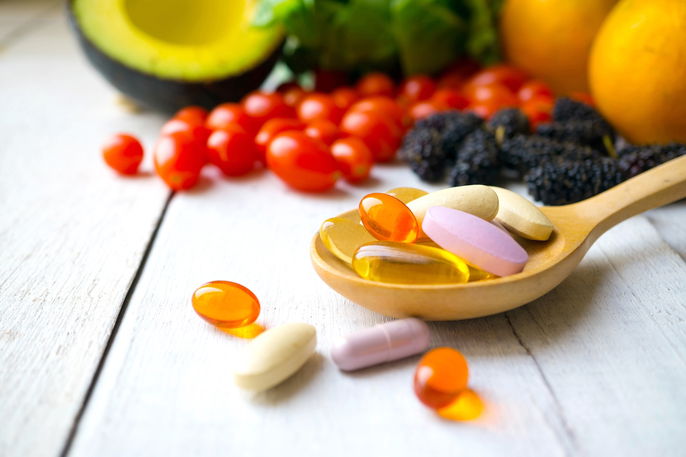The best menopause supplements include vitamin E, vitamin D and calcium, as these nutrients can play a vital role in reducing the risk for diseases that can emerge during menopause, like osteoporosis and diabetes.
Omega 3 and phytoestrogens can also be great supplements to take during menopause. These can help to relieve classic symptoms of menopause, like hot flashes, vaginal dryness and mood swings. Read more about common menopause symptoms and how they can present.
Supplementation for menopause can be done through dietary changes or by taking oral supplements. Oral menopause supple,ments should be advised by a doctor or registered dietitian, who can prescribe the types and quantities of vitamins and minerals that are most appropriate for you.

What supplements can I take during menopause?
The best menopause supplements include:
1. Vitamin E
Vitamin E contains antioxidant and anti-inflammatory properties that help to fight free radicals. It can be taken to improve the health and appearance of your skin and prevent premature aging. Check-out a list of vitamin E foods that you can add to your diet.
Furthermore, vitamin E also helps to boost immunity, prevent cardiovascular diseases and prevent the onset of neurological diseases, like Alzheimer's.
2. Calcium
Calcium can be taken to reduce the risk of osteoporosis, especially in women who have not chosen or cannot take hormone replacement therapy.
Calcium supplements should be taken with food, as taking it with other vitamins and minerals naturally increases its absorption.
Also recommended: 34 Calcium-Rich Foods (& Daily Calcium Recommendation) tuasaude.com/en/calcium-rich-foods3. Vitamin D
Vitamin D is essential for calcium absorption, and can be taken to promote bone health. It is often indicated to prevent the onset or worsening osteoporosis and prevent the risk for a fractures.
See a list of foods that are high in vitamin D that you can incorporate into our diet.
4. Phytoestrogens
Phytoestrogens are natural compounds that act similarly to human estrogens. The can be consumed to relieve menopause symptoms like night sweats and irritability.
Phytoestrogens can be found in foods like soybeans and soy products, tofu, flaxseed, sesame seeds, and beans. Phytoestrogens can also be found in supplement form, such as soy lecithin.
Also recommended: 37 Estrogen-Boosting Foods (& Health Benefits of Eating Them) tuasaude.com/en/foods-high-in-estrogen5. Omega 3
Omega 3 plays an important role in preventing of cardiovascular diseases, breast cancer and depression, which menopausal women are at a higher risk for.
Read more about omega-3 foods that you can consume to ensure you are getting your daily recommended level.
6. Polyphenols
Polyphenols are bioactive compounds with antioxidant and anti-inflammatory properties. They can help to prevent the development of cardiovascular diseases and diabetes.
Polyphenols also help prevent premature aging, which is why it is important to include them in your diet through food or supplementation.
7. Vitamin C
Vitamin C is a type of water-soluble vitamin that acts as an antioxidant and participates in various metabolic processes. It is important for collagen production, and can help to reduce the appearance of stretch marks, wrinkles and expression lines that naturally appear with age.
Also recommended: Vitamin C Foods: 21 Foods, Supplements & How to Consume tuasaude.com/en/vitamin-c-foodsFurthermore, vitamin C promotes healthy hair and nails, and is needed for the formation of cartilage, tendons, ligaments and other tissues and structures in the body.






























